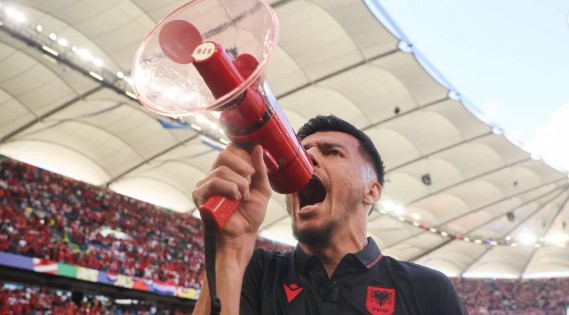A dark cloud loomed over Euro 2024 this week as UEFA, European football’s governing body, contended with a series of incidents involving offensive chants and fan misconduct during the group stage match between Albania and Croatia in Hamburg.
Daku’s Leadership Ignited Controversy:
Albanian forward Mirlind Daku found himself at the centre of the firestorm. In the electrifying atmosphere following a dramatic 2-2 draw against Croatia, Daku seized the moment to address his nation’s passionate supporters using a megaphone. However, his actions backfired spectacularly. UEFA determined that the chants Daku led included offensive language, resulting in a two-match suspension for the player. This suspension is a significant blow to Albania’s Euro 2024 campaign, potentially forcing them to rethink their attacking strategy in the absence of their star forward.
Wider Repercussions: A Cascade of Fines and Investigations
The repercussions extended far beyond Daku’s suspension. UEFA came down hard on both the Albanian and Croatian Football Associations with hefty fines. The Albanian FA faces a €47,500 penalty (€25,000 for the chants and an additional €22,500 for pitch invasions and fireworks by fans). The Croatian FA was also not spared, receiving a €28,000 fine for the throwing and lighting of fireworks by their supporters.
Racism Concerns Spark Broader Scrutiny
UEFA’s efforts went beyond mere financial penalties. A more serious investigation was launched, focusing on “potential racist and/or discriminatory conduct by supporters in this match.” This investigation underscores the ongoing fight against racism and discrimination within European football, a challenge that continues to stain the beautiful game.
Taking to social media on Friday, Daku expressed regret for his actions.
“I understand the decision and I deeply apologize to anyone who was offended by the chants,”
he wrote. However, the damage was done. The incident reignited tensions between Albania, Croatia, and Serbia. Before the match, Serbia had threatened to withdraw from Euro 2024 altogether due to historical animosities and concerns over potential fan violence. Furthermore, North Macedonia’s football federation also demanded an apology from Daku for his actions.
READ ALSO: https://thecrux.com.ng/dramatic-late-equalizer-secures-group-a-top-spot-for-germany-in-euro-2024/
A Call for Sportsmanship and Respect:
The events surrounding the Albania-Croatia match serve as a stark reminder of the importance of sportsmanship and mutual respect within the beautiful game. UEFA’s actions, including the investigation into potential racism, demonstrate their commitment to tackling these issues.
A Long Road Ahead: Fostering Inclusion and Upholding Values
Moving forward, it’s crucial to address the root causes of such incidents. Educational initiatives at the grassroots level can play a vital role in promoting tolerance and inclusion within the sport. Football has the power to unite people across borders, and concerted efforts are needed from players, fans, clubs, and governing bodies to ensure that Euro 2024, and future tournaments, become a true celebration of football’s unifying potential, leaving prejudice and hatred on the sidelines.
UEFA itself has undertaken several initiatives aimed at combating racism and discrimination in European football. These include:
- The UEFA Respect campaign promotes diversity, inclusion, and social responsibility across European football.
- The implementation of a three-step procedure to tackle racist incidents at matches can range from stadium closures to points deductions.
- Working with member associations to implement anti-discrimination education programs.
These efforts are a positive step, but there is still more work to be done. By working together, all stakeholders in European football can help to create a more inclusive and welcoming environment for all.










